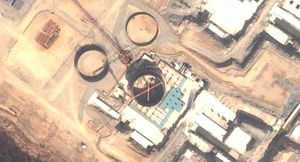On November 18, the UN General Assembly passed a resolution recommending that the International Criminal Court (ICC) should investigate the North Korean government for alleged human rights abuses. The UNGA resolution came nine months after a UN-commissioned report accused the Kim Jong-un regime of crimes against humanity.
As reported by North Korea’s Korean Central News Agency (KCNA), Pyongyang rejected the UN resolution. Before the vote, a North Korea delegate issued a statement calling the draft resolution “a product of political and military confrontation and plot against the DPRK [that] has no relevance with genuine promotion and protection of human rights.” The unnamed delegate dismissed the report as “a complication full of groundless political accusations and contradictions” based on “fabricated” testimonies from North Korean defectors. The statement also warned that Pyongyang would “strongly respond without slightest tolerance to any attempts on the part of hostile forces to abuse human rights issue as a tool for overthrowing the social system of our country.”
After the vote, North Korea’s foreign ministry clarified that threat by promising a new nuclear test. In a statement, the foreign ministry said that the UN resolution amounted to a U.S. attack on North Korea’s government. Given this “aggression,” Pyongyang said it would be “unable to further refrain from staging a new nuclear test.”
China’s own foreign ministry was not pleased by that response. In a press conference, spokesperson Hong Lei told reporters that China has a “clear and firm position on the Korean nuclear issue, that is, we should stay committed to realizing denuclearization of the Korean Peninsula.” Hong also repeated China’s customary call for a return to the Six Party Talks to address the North Korean nuclear question.
Beijing reacted sternly to Pyongyang’s last nuclear test in 2013 and analysts believe that the Kim regime has lost some support from China since then. The Obama administration has also noted some new toughness in China’s approach to its neighbor. U.S. Secretary of State John Kerry recently expressed appreciation for China’s efforts “to send a very clear message to the North Koreans that [the continued development of a nuclear program] is unacceptable to the Chinese.”
Of course, Beijing understands Pyongyang’s angry response to the UN resolution; China itself often complains of being unfairly targeted for human rights critiques. When it comes to lambasting the use of human rights as a pretext for fomenting political unrest, China and North Korea are on the same page.
Back in March, China officially rejected the UN-commissioned report on human rights violations in North Korea, echoing Pyongyang’s line that the report’s conclusions were groundless. Unsurprisingly, Beijing’s UN delegation also voted against the resolution on Tuesday. Foreign ministry spokesperson Hong Lei told reporters that “human rights issues shall not be politicized or be used to pressurize other countries.” He added that China does not believe human rights issues should be discussed by the UN Security Council or taken up by the ICC. “The referral of human rights issues to the International Criminal Court is not conducive to their resolution,” Hong said. China’s position on the UN Security Council will keep North Korea from ever facing prosecution from the ICC.
However, China is not keen to see another nuclear test take place in Pyongyang, and was quick to remind the world that it is committed to denuclearization. Especially given the fact that the UN resolution is ultimately toothless – both China and Russia will prevent the Security Council from acting on the issue – there’s no reason for North Korea to literally go nuclear in its response.
As we saw in 2013, ultimately Chinese pressure cannot prevent a determined North Korean government from carrying out a nuclear test. But Beijing will certainly do its best to prevent a North Korean-made crisis from undoing the progress China has made in regional diplomacy and leadership over the past two weeks.

































